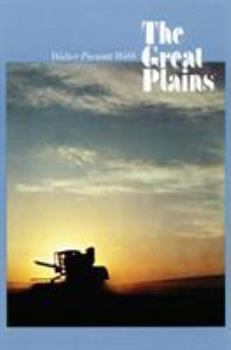The Great Plains
Select Format
Select Condition 
Book Overview
This classic description of the interaction between the vast central plains of America and the people who lived there has, since its first publication in 1931, been one of the most influential, widely known, and controversial works in western history. Arguing that "the Great Plains environment. . .constitutes a geographic unity whose influences have been so powerful as to put a characteristic mark upon everything that survives within its borders,"...
Format:Paperback
Language:English
ISBN:0803297025
ISBN13:9780803297029
Release Date:August 1981
Publisher:University of Nebraska Press
Length:525 Pages
Weight:1.29 lbs.
Dimensions:1.1" x 5.3" x 8.0"
Customer Reviews
2 ratings
Seriously the best book I've ever read
Published by Thriftbooks.com User , 23 years ago
So many people use the cliche "this is the best book I've ever read" when critiquing it. I mean it. This book, 70 years old this year, is a brilliant historical work. Webb calls the 98th meridian an "institutional fault line" that required alteration or abandonment of all the laws and implements used in pioneering east of the line. Webb offers the windmill, the six-shooter, and barbed wire as three examples of inventive genius that allowed pioneers to settle on the Great Plains. Webb cites Eastern land laws, as well as the old English common law, as impractical when used on the Plains. Interestingly, Webb states that the West was lawless in part because settlers had to disobey these impractical land laws in order to survive on the Plains. Webb examines the Great Plains from a multitude of angles to substantiate his thesis. He successfully defends it, and in the process creates a work that is of great interest to people from many walks of life.
The accolades given this book are well deserved.
Published by Thriftbooks.com User , 25 years ago
In the mid-1930s, this book won the Loubat Prize as the best work published over a five year period. In 1950, a national panel of historians selected The Great Plains as the most significant historical work by a living author. This book continues to receive attention as reflected in the bibliographies of current books dealing with aspects of the American West.In 1893, historian Frederick Jackson Turner's essay "The Significance of the Frontier in American History," outlined his Frontier Theory. Turner asserted that the frontier was the decisive factor in creating an American nation distinct from other nations; that the frontier created dominant traits of individualism, freedom, materialism, originality, et. al. Turner called the frontier a "safety valve" of abundant resources which shopuld be exploited for the benefit of the national good. Turner's theory foresaw progress from the simple to the complex.Webb's "The Great Plains" modifies Turner's theory by pointing out the steady progression of settlement westward from the timbered and well watered Atlantic Coast to the edge of the Great Plains; the 98th Meridian, an "institutional fault line." Webb contended the great plains were neglected until all lands that were timbered and well watered were taken; that pioneers "jumped" across to the Pacific Slope where they could also employ long-standing techniques that had been successful in the East.Not until the post Civil War era were pioneers able to settle the great plains (characteristics: a level surface, an absence of timber, and a deficiency of rainfall), and then only by drastically altering or changing their previous frontier techniques. According to Webb, westerners on the great plains became progressive because they relied upon change in order to overcome their harsh environment. The pioneer used what was given him and the results astonished the world.Great plains pioneers had to build houses without timber, burn fires without wood, carve furrows in soil so matted and tough an ordinary wood or iron plow would snag in the sod or skitter across its surface like a stick over ice, draw water from an arid or semi-arid land, and grow crops that could exist with little water. Webb contends adaptation and innovation in the development and use of new or existing products and techniques allowed the hardy pioneers to conquer their environment. In essence, often reverting from the complex to the simple - "geographic reality."This book is interesting and easily read. Webb's research ranges from the Indians, Spaniards, Americans, cattle, and water - encompassing the esoteric and the simple. For example, he delves into the Land Law of the West, in all its complexity (written by Webb 68 years ago) and the parallel and distinct differences in sign language used by deaf mutes and the plains Indians.Webb's scholarly research is reflected in the extensive bibliography that follows each chapter. The index is us






